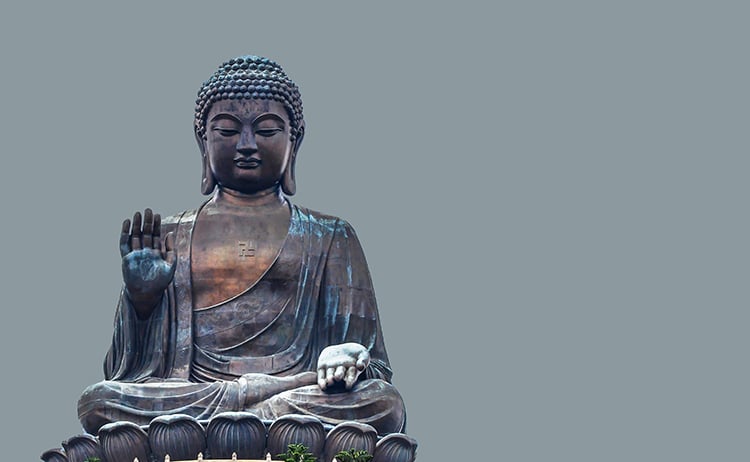What Are The Core Buddhist Values?
Category: Buddhist Path | Recent Meditation Posts

The core Buddhist values are centered on non-harming and being of benefit to others. When we minimize harm and act as helpers, we make way for a peaceful state of mind and the cessation of suffering, the goal of the Buddhist path. Learn more about Buddhist values and how they are reflected in the three disciplines of ethics, meditation and wisdom.
- What does Buddhism say about morality?
- What are the Buddhist ethical codes?
- What are the rules of Buddhism?
- Does Buddhism have commandments?
- What is the Buddhist concept of sila?
- What does Buddhism say about compassion?
- Does Secular Buddhism teach ethics?
- Buddhism And Morality
The Buddha taught that body, speech and mind are deeply interconnected. Our thoughts, words and actions each influence the other. The mind will rest in peace and experience freedom from suffering when we cease perpetuating suffering with our words and actions. Moral behavior, doing what we can to minimize harm and be of benefit to others, is foundational to making progress along the path.
This is good news because it means that whether we experience our reality as evidence of samsara or nirvana is up to us. It is within our power to change our behavior, our minds and our experience of the world. Buddhist teachings therefore span three disciplines, ethics, meditation and wisdom. By training in all three, we learn to express and experience the core human value of genuine basic goodness.
Buddhist Ethics
Moral behavior is often defined as that which we intuitively understand as the right thing to do. Ethics, on the other hand, often refers to a code of conduct recognized by a group or system. In Buddhism, one is expected to be self-disciplined when it comes to moral conduct. Teachings on the 5 precepts, the 10 misdeeds and the various sets of Buddhist vows serve as guides for ethical behavior.
Buddhists don’t follow these ethical codes merely because a teacher has told them to, they follow these codes because it is the wisest thing to do. Moral discipline, meditation and wisdom strengthen one another. When we meditate on karma as well as past and future lives, we come to the conclusion that acting kindly is the only reasonable thing to do. Training in meditation makes it easier for us to choose kindness in all situations, even when pressed or stressed.
Buddhist Precepts
The Buddhist precepts are vows one takes as a commitment to protect the mind and establish good karma, requisites for our progress along the Buddhist path. The five precepts are actions to abstain from to prevent harm. There are different sets of precepts for monks and laypeople. To commit to the five precepts as a layperson is to make a promise not to kill, steal, harm another with your sexual behavior, lie or cloud your mind with intoxicants.
Also known as the vows of individual liberation, the five precepts are important because they set the foundation for self-discipline and a clear mind. A steady and clear mind, and the intent to avoid harm, are essential to our practice.
Buddhist Commandments
The precepts are not the only rules of Buddhism, guidelines for morality are expressed in many ways. One such list, often compared to the 10 commandments, is the Mahayana Buddhist list of 10 non-virtuous actions. According to the law of karma, participating in these 10 harmful actions can only lead to a negative consequence. To reap positive benefits, we can do more than merely avoid these 10 misdeeds. We can actively work to cultivate their opposite.
The 10 non-virtues encompass 3 actions of the body, 4 of speech, and 3 of the mind. Thus, by living in alignment with these virtues, we cultivate non-harming with our body, speech and mind.
The Buddhist Concept Of Sila
Sila is a Sanskrit word that can be translated as virtue, ethics, morals or self-discipline. On the Buddhist eightfold path, Sila is represented by right speech, right action and right livelihood. Sila is also included among Mahayana Buddhism’s six paramitas, or six perfections. The paramitas are the actions of a bodhisattva, one who works toward becoming enlightened for the benefit of all beings.
Moral discipline informs and is informed by the virtues of generosity, joyful effort and patience. It is also intimately connected with our meditation practice. When practiced with intention, sila is an act of wisdom.
Buddhism and Compassion
Buddhist morality is not only expressed by avoiding harm, but by intentionally participating in acts of loving-kindness and compassion. In Buddhism, there is no wisdom without genuine, boundless compassion, and vice versa. Our meditation practice is more than a training in concentration, it is intended to open the heart. Meditation helps us develop an immeasurable loving-kindness and compassion, one that is applied joyfully and equally to all living beings.
The intentional cultivation of such positive qualities is referred to as building merit. Merit is a special type of positive karma that empowers and protects us as we progress in our spiritual journey.
Secular Buddhism and Ethics
Secular Buddhism emphasizes Buddhism’s logic, discarding rituals or aspects of the practice that may seem religious or supernatural to today’s Western practitioners. In secular Buddhism, for example, there is no monastic tradition or chanting mantra. Secular practitioners believe in the value of morality but interpret ethical codes of conduct through the lens of modernity and today’s social norms.








